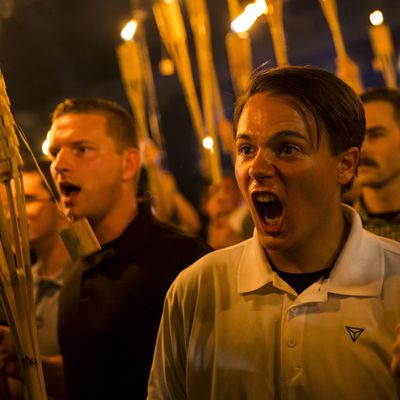
Jason Kessler, chief organizer of last year’s lethal “Unite the Right” rally in Charlottesville, Virginia, originally planned to return to the scene of the crime with an anniversary commemoration this month. But after he was denied a permit by the city of Charlottesville, he refocused his attention on a city with fewer Confederate monuments to defend but more robust media access and ideal proximity to his movement’s most prominent sympathizer. Barring some last-minute change of plans, “Unite the Right 2” will be held on August 12 in Washington, D.C., at Lafayette Park, in the shadow of the White House.
The palpable lack of interest in a Charlottesville reunion among many of the white-supremacist groups that disgraced themselves last year makes the extent of participation in a D.C. sequel questionable, as Jane Coaston reports:
It’s not clear how many people will attend Unite the Right 2 — many white nationalists have already said they have no interest in going, while others who might otherwise attend are enmeshed in legal troubles stemming from last year’s rally….
A year ago, members of the alt-right felt strong enough to venture off the internet and into the real world. Now, the movement has largely been broken — by the law, by widespread disapproval, and mostly by their own actions — and Unite the Right 2 could represent its last stand.
Kessler is taking some steps to make the second rally a bit less like a miniature version of the Nuremberg Rally: “American flags and Confederate flags are permitted, but Nazi flags, unlike last year, are not.” And a paramount issue seems to be security. While it’s not clear how many fans of “white civil rights” will show up to rally with Kessler (his permit application estimated a mere 400), it’s extremely likely that counterprotesters will be present in large numbers. A coalition of groups operating under the banner of ShutItDownDC is planning an action to “Defend the District From White Supremacy.” It may prove difficult for white-pride ralliers to get to Lafayette Park in good order; the DC Metro system discarded one plan to protect their safe transit, as the Washington Post reports:
Metro is no longer considering running separate trains for protesters participating in the Aug. 12 “Unite the Right” white nationalists rally in the District, the transit agency’s board chairman said Saturday….
Word about the possibility of the service for rallygoers spread quickly Friday and Saturday, drawing condemnation from those who decried “special treatment” for white nationalist groups, which are focused on the goal of achieving a whites-only state or the separation of whites from other groups. Others thought the possible move to constitute a form of segregation.
Yeah, you could see the angry jokes about a special Metro “White Line” writing themselves.
The real mystery, however, is how the White House reacts to this assemblage of racists whose proudest accomplishment in Charlottesville last year was to attract sympathetic comments from the president of the United States, who described them as victims as much as perpetrators of “hatred, bigotry and violence.” By moving their act into quite literally the president’s neighborhood, and setting the stage for more violence, they may be looking for a fresh infusion of respectability from the politician so many of them regard as a fellow traveler. And while it might seem ridiculous for Trump to court the sort of firestorm his Charlottesville remarks ignited, it’s not as though he’s suffered much lasting damage from them, as Annie Karni observes:
[I]n some ways, the experience of Charlottesville, as well as his ability to recover from any short-term crisis, has been empowering for Trump and his allies. Three former aides said the takeaway from Charlottesville is the nihilistic notion that nothing matters except for how things play.
The approaching Charlottesville anniversary certainly did nothing to inhibit Trump from remarks so offensive that even the First Lady seemed to object:
Just take a look at Trump’s history of ridiculing the intelligence of prominent black Americans. In March, Trump first began his baseless claim that frequent Trump critic, Democratic Rep. Maxine Waters from California, has a “very low IQ.” He was doubling down on his insult in July when he said, “I mean, honestly, she’s somewhere in the mid-60s, I believe that.” Apparently, to Trump, repeatedly smearing a black critic as having a low IQ is an effective way of delegitimizing her to his political base.
And on Friday, Trump escalated this line of attack on well-known African-Americans. This time, the leader of the nation took to Twitter to mock the intelligence of both NBA great LeBron James and CNN anchor Don Lemon: “Lebron James was just interviewed by the dumbest man on television, Don Lemon. He made Lebron look smart, which isn’t easy to do. I like Mike!” (The “Mike” in the tweet was NBA legend Michael Jordan, who issued a statement in response standing with LeBron James.) Despite Trump’s twitter attack, Melania Trump praised the NBA superstar’s charity work less than a day later.
Perhaps Trump will rise to the occasion this weekend when the white supremacists rally in the shadow of the White House — still more symbolism of course. Or maybe he’ll ignore it all. But it’s unmistakably clear why racists figure he’s one of them, even if he has to wink and blow dog whistles and otherwise be coy about it. And that means the Charlottesville white riot may be commemorated for a long time as the first out-in-the-open, loud-and-proud white-power event in an era where “political correctness” has died.






























